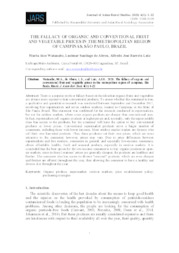The fallacy of organic and conventional fruit and vegetable prices in the metropolitan region of Campinas, São Paulo, Brazil.
The fallacy of organic and conventional fruit and vegetable prices in the metropolitan region of Campinas, São Paulo, Brazil.
Author(s): WATANABE, M. A.; ABREU, L. S. de; LUIZ, A. J. B.
Summary: Abstract: There is a popular myth or fallacy based on the idea that organic fruits and vegetables are always more expensive than conventional products. To assess whether this statement is true, a qualitative and quantitative research was conducted between September and December 2017, involving four supermarkets and seven outdoor markets, located in Campinas, in the State of São Paulo, Brazil. This statement was confirmed for the research conducted in supermarkets, but not for outdoor markets, where some organic products are cheaper than conventional ones. In fact, supermarkets sell organic products at higher prices and, normally, only the upper middle class has access to the products, but the consumer will have the option to buy conventional products at lower prices. Conventional supermarket products serve a larger number of consumers, including those with lower incomes. Most outdoor market traders are farmers who sell their own harvested products. Thus, these producers set their own prices, which are more attractive to the consumer; however, prices may vary. Due to price differences between supermarkets and free markets, consumers in general, and especially low-income consumers, obtain affordable, healthy, fresh and seasonal products, especially in outdoor markets. It is concluded that the best option for the low-income consumer is to buy organic products in open-air markets, since in these locations? prices are generally cheaper, the products are healthier and fresher. The consumer also has access to diverse \"seasonal\" products, which are even cheaper and fresher are offered throughout the year, thus allowing the consumer to have a healthy and diverse diet throughout the year.
Publication year: 2020
Types of publication: Journal article
Unit: Embrapa Environment
Observation
Some of Embrapa's publications are published as ePub files. To read them, use or download one of the following free software options to your computer or mobile device. Android: Google Play Books; IOS: iBooks; Windows and Linux: Calibre.
Access other publications
Access the Agricultural Research Database (BDPA) to consult Embrapa's full library collection and records.
Visit Embrapa Bookstore to purchase books and other publications sold by Embrapa.

